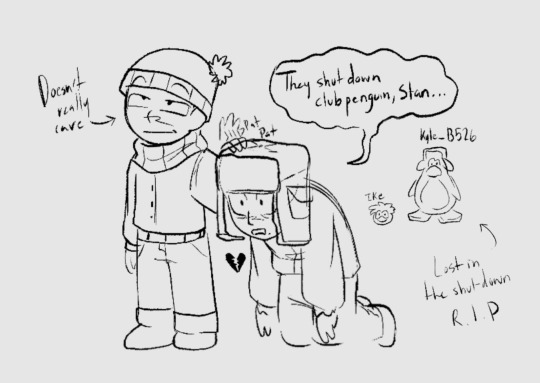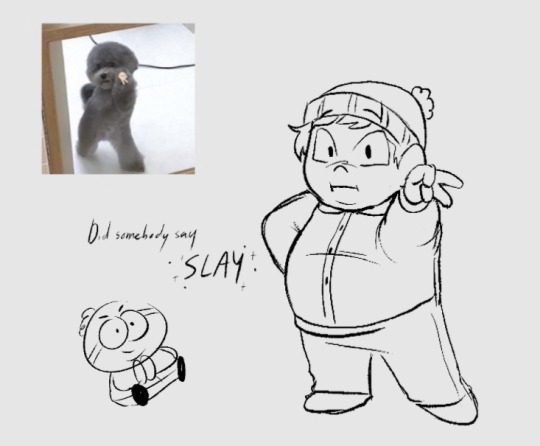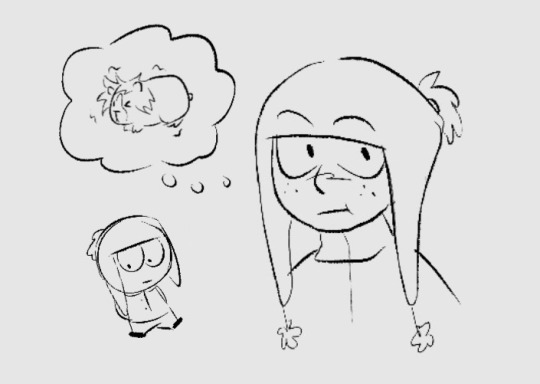#shout out to club penguin being 18 years old now
Text




Forgot to share these oops
#veearts#south park#stan marsh#kyle broflovski#kenny mccormick#eric cartman#craig tucker#tweek tweak#Kind Of. he's there as a guinea pig LOL#sp fanart#fan art#shout out to club penguin being 18 years old now#and fnaf movie day soon#yipeeee
2K notes
·
View notes
Text
I am so upset over the Gaud "discourse" (bullying) I can't sleep, so here is me running through the "reciepts" because every time Gaud talks someone jumps on and attacks..
A little perspective, I had never heard of @biggest-gaudiest-patronuses until last month. So I'm not an avid follower, I didnt participate in Gaudapocolpyse, or watch any of the livestreams- I just hate bullying and railroading. I am a female Autistic Jew who has survived childhood sexual abuse (and I'm adding that because of some of the stuff people are accusing Gaud of).
I went through the "reciepts" you can find on biggest-gaudiest-callout the updated version as of January 27, 2019 and I made notes. So buckle up cause this is going to be a long post. Bear with me I am on a cell phone so there will probably be a plethora of grammar and spelling errors. Here goes:
-the callout starts by stating that Guad is 27 and has a mostly minor fanbase this statement is made on the assumption that tumblr is 13+ and Guad makes "teenage humor" whatever that means, I'm a legal adult and I like the jokes, and one anon stating that they and their friends are 13/14. So it is just flat out assuming and you know what they say about assuming.
-next it states that Gaudpocalypse was a protest for the NSFW ban, which isn't true. It actually started because a person commented about an actual holiday (I believe in Catholasism) that had to do with pink that fell on the day. It was in the works before tumblr announced the change, so this was flat out bad fact checking.
-Gaud also commented that the "sexy" fan art they were expecting was Patrick Star in fishnets type stuff. They used NSFW, because as a fellow autistic they were taking it literally to mean Not Safe For Work, so not something you'd want to explain to a boss or co-worker- not porn.
-They have already addressed the Tuba fanfic, which is also not porn.
-Taking "age is just a number. a number estimating your proximity to death." to be pedophile related are purposely ignoring Guad's morbid death humor that they are known for.
-If we are vilifying people for reading yaoi, add me to the list. I went through a hard SasuNaru phase and not even 5% of it was G rated. (and you know what, I was a minor when I got into it and now that I've aged out of minorhood doesnt mean that I instantly stop liking what I liked).
-Shota: I went through a phase where I read rape, pedophilia, and even incest fanfics. And you know what, it was actually encouraged by my therapist. Sometimes people look at dark things because they are trying to work through their trauma. Now I don't know Guad's past, I don't know if there was abuse or anything, but either way: reading a manga, a fanfic, or even watching anime does not make you an abuser or pedophile. Sometimes it is a person the pedophile left behind trying to take control or figure things out. (The comparison is like saying that people that read James Patterson are serial killers or that only perverts watch Law and Order SVU).
-P.S. stop calling manga child porn. It cheapens what child porn actually is and the victims of it.
-"Recommending" Big Mouth on Netflix, personally I haven't watched a single episode, but it seems about the same level as South Park. It isnt meant for kids. And it obviously got approved by Netflix, so take it up with them if you don't like it.
-Okay hot take, apparently saying you don't want MAPs interacting with you coupled with wanting to know if someone is over 18 before you find them attractive makes you a pedophile- makes sense /sarcasm
-As a Jew, the whole sumptuary laws post was witty word play not antisemitism that Gaud wasnt even the OP for. (although the laws themselves are hella antisemitic, or at least were used for that purpose.) ((still doesnt make the two equal)).
-Wearing a kimono is not racist- I think you need a dictionary and a lesson on racism.
-Autism and Asexuality; Guad's post was about figuring yourself out and said "people on the autism spectrum are significantly more likely than general populace to identify as asexual or aromantic" - this is statistically accurate, there is no ableist statement here. They did not say all Autistics are asexual or that Autistics can't have romantic or sexual relationships, Gaud simply stated a fact and it was said in a post about themselves ans trying to figure out what they are.
-Reblogging a 12 year olds address for furbies, yeah not a good or smart decision and Gaud deleted the post. Nothing else can be done about it now and this happened over a year ago and as far as I've seen Gaud learned for the mistake ans hasn't done anything like that again.
-The Discord Server. Gaud asked for the server to be taken down. People are blaming Guad because they created the server and when they left things went south. The users were breaking Discord ToS and doing horrible things. However l, blaming Guad because they created the server is like blaming Ford for drunk drivers because they made the car.
-Canabalism- this is laughable. 98% of the time Gaud is posting as an incorpreal eldritch being...just really look at the blog as a whole and ask yourself if you're making smart conclusions.
-The "crayon fiasco": Guad raised money to eat a crayon on livestream. People have taken issue with this for a variety of reasons. 1) "Gaud said the money was for rent and bought champagne" no, no they didnt, that was a joke. The money was indeed for rent, the cheap champagne was bought with a gift card. 2) "The money could have gone to medical expenses or someone in need." People are allowed to give and not give however they see fit. This arguement is about as strong as standing in front of a movie theater and shouting that the patrons should donate their money to food banks instead of watching a show and when they still go watch the movie calling the movie evil forexisting. 3) "Gaud is manipulating minors into giving them money" first of all most minors don't have that much money and I see it no more manipulative (actually I see it way less manipulative) than my sister asking my mom for money for Club Penguin. It is paying for entertainment which we do all the time and I still have yet to see the stats that it is "mostly minors".
I'm just over everyone railroading and bullying Gaud. When Guad does apologize for something people start screaming that the apology is manipulation. You have made a situation where there is no winning. Gaud ignores the callouts and you don't like. Gaud asks for information on some of the accusations and they get called names. Gaud apologizes ans gets accused of manipulating. What do you honestly want? You have built an argument on stunted facts, and just scream loud enough and long enough trying to get Guad to break. People have already started blocking Guad based on the telephone game of rumors and "reciepts" that I just went through. Enough is enough. If you don't want to follow Gaud or read their posts that is up to you, but just be quiet already. In the words of Frozen "Let It Go".
@biggest-gaudiest-patronuses if you want me to take this down I will, it is your business after all. I just couldn't stand idly by and watch what these people are doing.
919 notes
·
View notes
Text
Science and Chemistry Classes
Protecting children in the metaverse: It's easy to blame big tech, but we all have a role to play
- Andy Phippen, The Conversation
In a recent BBC news investigation, a reporter posing as a 13-year-old girl in a virtual reality (VR) app was exposed to sexual content, racist insults and a rape threat. The app in question, VRChat, is an interactive platform where users can create "rooms" within which people interact (in the form of avatars). The reporter saw avatars simulating sex, and was propositioned by numerous men.
The results of this investigation have led to warnings from child safety charities including the National Society for the Prevention of Cruelty to Children (NSPCC) about the dangers children face in the metaverse. The metaverse refers to a network of VR worlds which Meta (formerly Facebook) has positioned as a future version of the internet, eventually allowing us to engage across education, work and social contexts.
The NSPCC appears to put the blame and the responsibility on technology companies, arguing they need to do more to safeguard children's safety in these online spaces. While I agree platforms could be doing more, they can't tackle this problem alone.
Reading about the BBC investigation, I felt a sense of déjà vu. I was surprised that anyone working in online safeguarding would be—to use the NSPCC's words—"shocked" by the reporter's experiences. Ten years ago, well before we'd heard the word "metaverse," similar stories emerged around platforms including Club Penguin and Habbo Hotel.
These avatar-based platforms, where users interact in virtual spaces via a text-based chat function, were actually designed for children. In both cases adults posing as children as a means to investigate were exposed to sexually explicit interactions.
The demands that companies do more to prevent these incidents have been around for a long time. We are locked in a cycle of new technology, emerging risks and moral panic. Yet nothing changes.
It's a tricky area
We've seen demands for companies to put age verification measures in place to prevent young people accessing inappropriate services. This has included proposals for social platforms to require verification that the user is aged 13 or above, or for pornography websites to require proof that the user is over 18.
If age verification was easy, it would have been widely adopted by now. If anyone can think of a way that all 13-year-olds can prove their age online reliably, without data privacy concerns, and in a way that's easy for platforms to implement, there are many tech companies that would like to talk to them.
In terms of policing the communication that occurs on these platforms, similarly, this won't be achieved through an algorithm. Artificial intelligence is nowhere near clever enough to intercept real-time audio streams and determine, with accuracy, whether someone is being offensive. And while there might be some scope for human moderation, monitoring of all real-time online spaces would be impossibly resource-intensive.
The reality is that platforms already provide a lot of tools to tackle harassment and abuse. The trouble is few people are aware of them, believe they will work, or want to use them. VRChat, for example, provides tools for blocking abusive users, and the means to report them, which might ultimately result in the user having their account removed.
We cannot all sit back and shout, "my child has been upset by something online, who is going to stop this from happening?" We need to shift our focus from the notion of "evil big tech," which really isn't helpful, to looking at the role other stakeholders could play too.
If parents are going to buy their children VR headsets, they need to have a look at safety features. It's often possible to monitor activity by having the young person cast what is on their headset onto the family TV or another screen. Parents could also check out the apps and games young people are interacting with prior to allowing their children to use them.
What young people think
I've spent the last two decades researching online safeguarding—discussing concerns around online harms with young people, and working with a variety of stakeholders on how we might better help young people. I rarely hear demands that the government needs to bring big tech companies to heel from young people themselves.
They do, however, regularly call for better education and support from adults in tackling the potential online harms they might face. For example, young people tell us they want discussion in the classroom with informed teachers who can manage the debates that arise, and to whom they can ask questions without being told "don't ask questions like that."
However, without national coordination, I can sympathize with any teacher not wishing to risk complaint from, for example, outraged parents, as a result of holding a discussion on such sensitive topics.
I note the UK government's Online Safety Bill, the legislation that policymakers claim will prevent online harms, contains just two mentions of the word "education" in 145 pages.
We all have a role to play in supporting young people as they navigate online spaces. Prevention has been the key message for 15 years, but this approach isn't working. Young people are calling for education, delivered by people who understand the issues. This is not something that can be achieved by the platforms alone.
0 notes